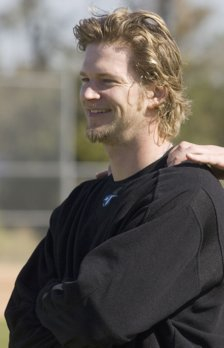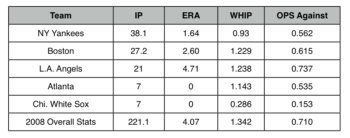The following post was written by weekend writer Brock Cohen.

In Plato’s Republic, Socrates talks of our natural inability to see things for what they truly are. Objects and concepts that we think we see and know (Jeff Kent, for instance) are actually copies of the ideal article (Jeff Kent-ness), which, for the most part, exists beyond our earthly comprehension. (For a painfully drawn out illustration of this, or if you’re simply having trouble falling asleep, please read Plato’s “Myth of the Cave.”) It’s only by having an extensive dialogue with others, says Socrates, that we can ever begin to approach the essence or –ness of something, thus enabling us to move beyond the illusions and “shadows” of our material world.
Which, naturally, brings us to A.J. Burnett.
Because when it comes to A.J., all we see are the shadows – spectacular, seductive shadows: The cocky, ferocious swagger; the no-hitter in his first full season; the 96 MPH heater and hammer curve; the 3.8 WAR in ’02 and 231 Ks in ’08; the World Series gem; and the repeated bullying of his future employer, culminating in a 8 IP, 13K dismantling at Rogers Center in 2008. That he can physically impose his will over opposing hitters like few others brings to mind images of Randy Johnson, Clemens, Pedro, and Ryan, which reinforces the illusion. This only adds to our confusion as to why he isn’t, you know, better.
Other than a stellar 8.2 K/9, Burnett’s 12-year career stat line is a nudge above pedestrian: 3.93 FIP, 1.32 WHIP, 107 ERA+, 21.5 WAR. We’re talking Charles Nagy-Ismael Valdez-Jarrod Washburn territory. This is really not such a horrible thing, of course, unless your curve has been tabbed as “unhittable,” or you’ve been called “the nastiest pitcher in baseball” by Derek Jeter.
Compounding matters, A.J. is given to unsightly implosions on the mound. These episodes typically begin with a seemingly benign wild pitch or hit batsman and culminate with an upper-deck grand slam by a .720 OPS-ing utility infielder and Sergio Mitre’s garbage-time trunk rotations in the bullpen.
Sometimes weeks pass in which Burnett, still mired in one of these patented sadness spirals, more closely resembles a frazzled, overmatched triple-A journeyman than the dominant enforcer he’s shown glimpses of being throughout his career: the shutdown ace that scouts gushed over, the cocky fireballer fans expect to show up for good any moment now. But these spells aren’t a recent development and are as much a part of A.J.’s overall body of work as his eye-popping moments of excellence. Baseball Prospectus nagged readers of this in 2009, immediately following his signing with the Yankees.
That the only three 200-inning seasons of Burnett’s career have been followed by either free agency of Tommy John surgery would seem to be a bad omen for the Yankees after giving him a five-year, $82.5 million contract. The Yankees were wowed by Burnett’s dominating them in five starts last year…but if you take those starts away, his 2008 ERA swells to a decidedly unimpressive 4.57, his WHIP gets up to 1.43, and his strikeout/walk ration shrinks to 2.4.
I remain skeptical about what B.P. was trying to imply here: That A.J. mails it in, save for contract years? That he lacks the focus and will necessary to remain consistently great against less storied franchises? That the Yankees were completely deluded in assessing his overall talent level?
Either way, B.P. was merely parroting the time-honored narrative that paints A.J. as a petulant hothouse flower who only performs to expectations in contract years. As the story goes, his failures as a starting pitcher are mainly due to deficiencies of will, mental toughness, and character rather than mechanical flaws or physical limitations. Because, as we all know, bad people are no good at sports.
Addressing the assumption that Burnett melts under pressure is the first order of business. A.J.’s career leverage numbers, shown in the table below, reinforce the notion that perception is often the enemy of reality.
For the Gold-Digger Corollary of these claims, I took a glance at four big-market clubs for whom A.J. may have been “auditioning” in 2008. I realize how un-dude it is of me to arbitrarily select a group of teams that A.J. might have had an interest in at the time, but it can’t possibly be any more unscientific than implying that Burnett stinks because he’s a lazy sack of insanity. So here’s what I found:
I realize the sample sizes here are microscopic. If anything, they reveal that A.J. may have indeed been galvanized to pitch against the big money teams in 2008, especially if one considers Burnett’s total body of work against the Red Sox (4.79 ERA, 1.435 WHIP). Whether or not the improvement in ’08 was due to a conscious contract push, the adrenaline rush of playing in front of crowds big enough to mute out the sound of his own breathing, or the added focus needed to navigate some very good offensive squads would be practically impossible to know for sure.
I vote for the latter.
While it’s specious to conclude that A.J. was lights-out against the Bombers in ’08 only because he was auditioning for a massive contract, it’s equally rash to completely discount the added intensity and self-discipline that pitching against a 900-run juggernaut like the Yankees might evoke. Time and again, we’ve witnessed soft-tossing journeymen or emergency call-ups summoning the ghost of Walter Johnson when facing the Yanks’ offensive machine – only to regress back to their former selves after posting double-digit strikeouts in eight maddening innings of one-run ball.
There could be a hundred different reasons for this phenomenon (which is actually more seldom than it seems). But like most of these one-hit-wonders, the inability to maintain long-term consistency – whether due to a lack of focus, faulty mechanics, excessive anxiety, or nagging injuries – is a fundamental component of A.J.’s essence, more so than all the striking cobras, flaming daggers and barbed wire armbands in the world.
Except what sets A.J. apart from the legions of mercurial journeymen is precisely what deludes scouts, fans, and pundits into hysterical visions of Tom Seaver 2.0: misplaced expectations. Conventional wisdom simply refuses to shut up about his raw stuff being among the best in the game while failing to acknowledge that baseball is littered with sexy fastball failures. The simple fact is that Burnett’s repertoire consists two pitches bundled in a package of a flawed delivery and erratic command.
And yet somehow we feel duped, refusing to acknowledge that beyond the egregious contract and awe-inducing gun readings, A.J. Burnett was never equipped to be much more than a mid-rotation starter, which is still a truly valuable commodity. But Plato would say we’re fixated on the deception of the “shadows,” unable to see – and, more importantly, accept – the true essence of A.J.
(AP Photo/Frank Gunn)


Leave a Reply
You must be logged in to post a comment.